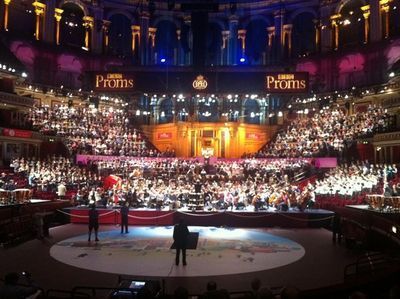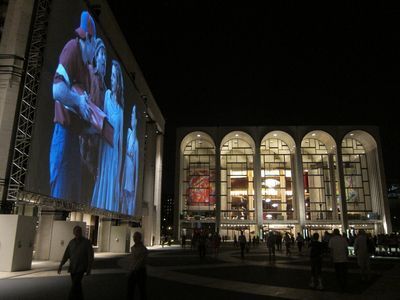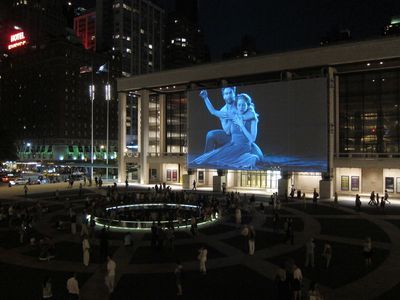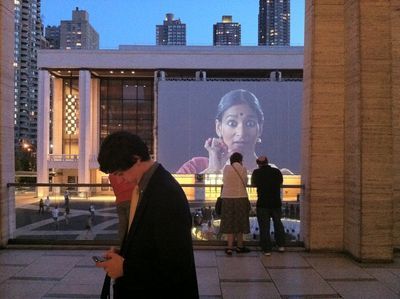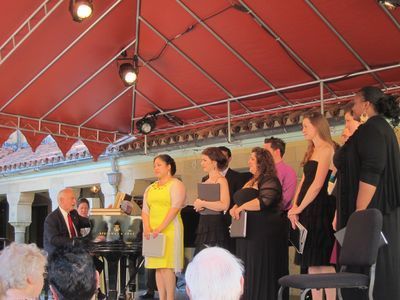Alex Ross's Blog, page 225
July 20, 2011
Miscellany: the great Gothic debate, etc.
Photo: Tom Service. The performers, not the audience.
I always pay close heed to the younger composers that Aaron Jay Kernis and company select each year for the Minnesota Orchestra Composer Institute. NewMusicBox has next year's list: Michael Holloway, Adrian Knight, Andreia Pinto-Correia, Shen Yiwen, and Hannah Lash, who is already somewhat widely noted.... The excellent Philadelphia critic David Stearns is now blogging at ArtsJournal. I've also belatedly added Superconductor to my bloglist.... The Borders chain, after struggling for years, is closing down completely. Anastasia Tsioulcas, at NPR Music, assesses the impact on classical CD sales.... Musiqa of Houston announces an enticing, diverse 2011-12 season.... Charles Downey at ionarts always has choice picks for what to see and hear online.... The recent presentation of Havergal Brian's gigantic Gothic Symphony at the BBC Proms inspired widely differing opinions, to say the least. Read, among others, Edward Seckerson ("an incomprehensible, albeit sporadically thrilling, mess"), Andrew Clements ("no spurned masterpiece"), 5:4 ("undeniable originality of thought"), David Nice ("I'm hanging out the garlic"), Barry Millington ("blazing conviction"), Gavin Plumley ("mind-blowing barbarity"), Jessica Duchen ("the White Elephant is a familiar story"), Bob Shingleton ("classical music must beware of programming for the Twitter audience"), and Kenneth Woods ("incompetent ... insane ... moving ... disturbing"). Judge for yourself on BBC 3, where a replay is available through Saturday.
July 18, 2011
The Italian opera situation
At the Brink. The New Yorker, July 25, 2011 (subscribers only).
The attached video shows Riccardo Muti's remarkable speech [see 7:30] after "Va, pensiero" at a Rome Opera performance of Nabucco in March. The crucial passage may be translated thus: "When the chorus sang 'Oh mia patria sì bella e perduta!' [Oh, my country so beautiful and lost!] I thought to myself that if we slay the culture on which the history of Italy is founded, truly our country will be beautiful and lost."
July 17, 2011
Slowness 2
July 15, 2011
Merce and John at Lincoln Center
Photo: Cage-Cunningham oven manual, John Cage Trust.
Tomorrow, the Lincoln Center Festival, which has been very strong on music this year, will present Merce Fair, a daylong tribute to the late Merce Cunningham. Needless to say, the music of John Cage and allied figures will figure strongly in the proceedings, which will go from ten in the morning until ten at night. (At the Lincoln Center page above you can download a handy pdf of the complete schedule.) Starting at 3:50PM, the spectacular Allen Room at Jazz at Lincoln Center will be the scene of a series of Musicians' Concerts, with work of John King, David Behrman, Alvin Lucier, David Tudor, Christian Wolff, and, of course, Cage himself. Selections from Cunningham and Cage's manuscripts are on display in the Archive Room, courtesy of the New York Public Library for the Performing Arts.
When critics agree (encore)
Sedgwick Clark, the editor of the Musical America International Directory of the Performing Arts, is among the most experienced and knowledgeable concertgoers I know. If you ask him about, say, great performances of Mahler's Fifth he's heard over the years, he will cite Solti with the Chicago and Bernstein with Vienna, and then trump you by mentioning a Sergiu Comissiona / Baltimore Symphony account he heard in 1975. So I'm proud to say that for the second year in a row Sedge and I have been in perfect agreement about what was the most remarkable concert of the regular season. Last season, it was the Minnesota Orchestra playing Sibelius's Kullervo (Sedge's blog post here, my review here); this season, it was the Oregon Symphony's stunning war program at Spring for Music.
July 14, 2011
Slowness returns
David Michalek's latest slow-motion photograph work, Portraits in Dramatic Time, is now playing on Lincoln Center Plaza. There is an optional soundscape by Du Yun. Bruckner might also be an appropriate choice.
Previously: Slow Dancing.
Happy Bastille Day
Operatic miscellany
With bad news billowing all over, let's note a few tendrils of the good. The San Francisco Opera, which has been going through a spell of deep worry (see a recent Joshua Kosman piece), had a big success with its Ring cycle. The show effectively sold out, generating $7,236,673 in box-office income.... Also, the consistently adventurous Minnesota Opera balanced its budget for the ninth season in a row, playing to 92% capacity. This record is especially noteworthy given Minnesota's history of championing new works and offbeat repertory; they offered Bernard Herrmann's Wuthering Heights this season. Yes, AGMA's Alan Gordon, you can do well at the box office without putting on Traviata and Carmen round the clock, as City Opera's own history amply shows.... What might have been (but probably couldn't) in NYC: Zachary Woolfe visits Gerard Mortier in Madrid and sees his presentation of Messiaen's St. Francis, which opened the 2009 City Opera season in a fantasy parallel universe.... Just recently I was wandering Venice's canals looking for the sites of theaters where Francesco Cavalli's operas played. Tonight and Saturday night, the Vertical Player Repertory completes its run of Cavalli's Calisto by the side of the Gowanus Canal in Brooklyn, slightly less historic but no less pungent. John Yohalem reviews the show at Parterre.
July 13, 2011
Caramoor notes
Will Crutchfield's long-running Bel Canto series at the Caramoor Festival, north of new York, had another happy outing last weekend with Guillaume Tell, Rossini's operatic valediction. (There is one more performance on Friday.) The cast wasn't flawless, but I'm not sure who'd be able to field a flawless cast in Tell these days. Michael Spyres certainly did not embarrass himself in the semi-impossible tenor role of Arnold, even if he struggled with the extreme upper register at times, and Daniel Mobbs supplied a steady center of gravity in the title role. The stars were the women: Julianna Di Giacomo, rich-voiced if a little uncontrolled as Mathilde; Talise Trevigne, glitteringly precise as Jemmy; and Vanessa Cariddi, displaying a smoky lower register in the mezzo role of Hedwige. Their Act IV trio was the vocal highlight of the night. Crutchfield conducted splendidly, generating palpable energy in the St. Luke's Orchestra. I also attended an afternoon seminar-concert with Crutchfield, the great Italian-opera scholar Philip Gossett (at the piano above), and young artists from the Caramoor program, in which we got to hear several numbers that Crutchfield elected to omit from the main presentation. (Charlotte Dobbs, whom I last heard singing The Book of the Hanging Gardens with Mitsuko Uchida at Marlboro, was especially fine in Jemmy's "Ah! que ton âme se rassure.") Gossett emphasized how the reputation of Tell was long distorted by its Italian-language version, which amounted to a political bowdlerization, with references to "liberty" and "tyrants" omitted. (When Muti conducted Tell in Italian at La Scala, Gossett insisted that he use an amended libretto. The Met, alas, ignores Gossett's work.) Gossett also spoke eloquently of the power of the ending — that slow finale that soars through a wide harmonic space, C major to A minor to F major to D minor to B-flat major to G minor to E-flat major, evoking the "horizon immense" of human possibility. That Rossini should have stopped composing opera after writing such a finale is shocking: it feels like the birth of a new world. These few minutes are in themselves worth the trip to Katonah.
July 12, 2011
NYC Opera's latest day of reckoning
George Steel, the general manager and artistic director of New York City Opera, announced the company's 2011-12 season this afternoon in a press conference at the Guggenheim Museum. Outside, representatives of the AGMA union, orchestra players, and singers, Catherine Malfitano among them, denounced Steel's plans and declared him unfit to manage the company. You can see a few moments from the protest in this NY1 report. Brian Wise has an even-handed story for WQXR.
What is there to say? It's a grim situation. I, too, have had doubts about Steel's ability to lead; last season was discouraging, in terms of programming, ticket sales, marketing, and public relations. At the press conference, Steel often seemed to be dancing around issues rather than confronting them directly. The existence of an excoriating protest letter signed by dozens of leading opera singers, Plácido Domingo among them, should have been acknowledged at the outset and not during the question period, when a journalist brought it up. On the other hand, the 2011-12 season seems, on paper, fairly sound. I'm not one of those who believe that the company cannot exist outside Lincoln Center, and Steel might well be able to build a following in the new venues he has apparently lined up. (The marketing will require a drastic makeover.) The prospect of hearing Telemann's Orpheus at the Museo del Barrio is enticing. There's an excellent plan for free performances of Shakespeare operas in league with Shakespeare in the Park. Yet to restore its identity the company will need to have a real home. Among other things, it will need a place to rehearse. Perhaps, if the two productions at BAM next season are a success, the relationship will deepen.
All this is somewhat theoretical, given the current and seemingly worsening conflict with the union. The company is offering a drastically reduced contract, effectively making the orchestra and chorus into pick-up groups. The budget is plunging to $13 million. Those on the union side show no signs of accepting the proposal, and their rhetoric is getting more aggressive. One of Dan Wakin's recent Times stories quotes an AGMA leaflet saying that NYC Opera is fated to become "an itinerant, traveling, part-time company of subway station singers." Will any performer who signs with the company — Rod Gilfry, say, who is slated to appear in Così fan tutte — now be subject to such name-calling? Will the city venues with whom Steel has announced partnerships still take his calls when the unions go to war? How much money can you raise when the most famous opera singer on the planet is against you? I hope there is still time for a compromise to be worked out, but today's events didn't leave me feeling wildly optimistic.
Alex Ross's Blog
- Alex Ross's profile
- 425 followers


